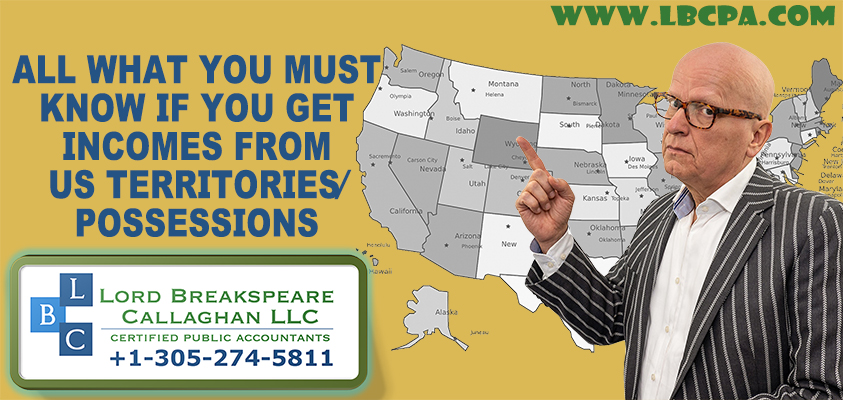LBCPA News 
Click here to go back
Individuals Living or Working in U.S. Territories/Possessions

An individual who has income from American Samoa, the Commonwealth of the Northern Mariana Islands (CNMI), Guam, Puerto Rico or the U.S. Virgin Islands will usually have to file a tax return with the tax department of one of these territories. In some situations, you may have to determine if you are a resident or a nonresident of the territory. For forms and advice on filing a territory tax return, contact that territory's tax department. The addresses and telephone numbers for the tax departments of the U.S. territories may be found in Publication 570, Tax Guide for Individuals With Income From U.S. Possessions. Additional information about the U.S. territories can be found at State and Local Government on the Net.
If you have income from one of these U.S. territories, you may have to file a U.S. tax return only, a territory tax return only, or both returns. This generally depends on whether you are considered a bona fide resident of one of the U.S. territories. In some cases, you may have to file a U.S. return, but be able to exclude income earned in a territory from U.S. tax. Filing requirements for specific U.S. territories are explained in Publication 570, Tax Guide for Individuals With Income From U.S. Possessions.
Possession Exclusion for Bona Fide Residents of American Samoa
Currently, the possession exclusion - under Internal Revenue Code (IRC) section 931 - applies only to U.S. citizens or resident aliens who are bona fide residents of American Samoa. If you qualify for this exclusion, you may have to attach Form 4563, Exclusion of Income for Bona Fide Residents of American Samoa, to their U.S. federal individual income tax returns.
Individuals in the following U.S. territories are NOT eligible for the possession exclusion: Baker Island, the CNMI, Guam, Howland Islands, Jarvis Island, Johnston Island, Kingman Reef, Midway Islands, Palmyra, Puerto Rico, the U.S. Virgin Islands, and Wake Island.
Please refer to Publication 570, Tax Guide for Individuals With Income From U.S. Possessions, for the exclusions, credits, and deductions which apply to residents of the CNMI, Guam, Puerto Rico, and the U.S. Virgin Islands.
Determining Residency Status in U.S. Territories
IRC 937 establishes the criteria for determining the residency of an individual in American Samoa, the CNMI, Guam, Puerto Rico, and the U.S. Virgin Islands, and for determining whether income is sourced in a U.S. territory. An individual is generally considered a bona fide resident of a U.S. territory if he or she (1) is physically present in the territory for 183 days during the taxable year, (2) does not have a tax home outside the territory during the tax year, and (3) does not have a closer connection to the U.S. or a foreign country. However, U.S. citizens and resident aliens are permitted certain exceptions to the 183-day rule. For a detailed explanation of the U.S. territory residency rules and income sourcing rules, please refer to Publication 570, Tax Guide for Individuals With Income From U.S. Possessions.
IRC 937 also establishes the filing requirement for Form 8898, Statement for Individuals Who Begin or End Bona Fide Residence in a U.S. Possession for individuals who became or ceased to be a bona fide resident of a U.S. Territory. If you are required to file Form 8898 for any tax year and fail to file it, you may be subject to a penalty of $1,000.
Individuals who are required to file Form 8898 generally must do so by the due date (including extensions) for filing Form 1040 or Form 1040-NR. Form 8898 must be filed by itself; do not file it with Form 1040 or Form 1040-NR. Refer to Residents of U.S. Possessions-Form 8898 Bona Fide Residence for more information.
Self-Employment Tax
A U.S. citizen who is self-employed in a U.S. territory must pay self-employment tax on net self-employment earnings of $400 or more. This rule applies whether or not the earnings are excludable from gross income (or whether or not a U.S. income tax return must otherwise be filed).
Your payments of self-employment tax contribute to your coverage under the social security system. Social security coverage provides you with old age, survivor, and disability benefits and hospital insurance.
If you are a resident of American Samoa, the CNMI, Guam, Puerto Rico, or the U.S. Virgin Islands who has net self-employment income and you do not have to file Form 1040 with the United States, use Form 1040-SS, U.S. Self-Employment Tax Return, to figure your self-employment tax.
Note: If you are a resident of Puerto Rico, you can file Form 1040 (PR) instead of Form 1040-SS. Form 1040 (PR) is the Spanish-language equivalent of Form 1040-SS. These forms must be filed with the U.S. Internal Revenue Service at the address shown in the instructions for Form 1040 (PR) and Form 1040-SS.
If you have any questions regarding accounting, domestic taxation, essential business accounting, international taxation, IRS representation, U.S. tax implications of Real Estate transactions or financial statements, please give us a call at +305-274-5811.
Source: IRS






